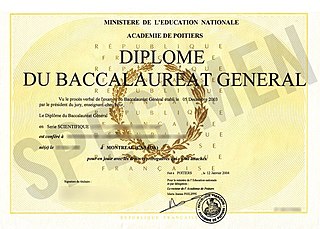
The baccalauréat, often known in France colloquially as the bac, is a French national academic qualification that students can obtain at the completion of their secondary education by meeting certain requirements. Though it has only existed in its present form as a school-leaving examination since Emperor Napoleon Bonaparte's implementation on March 17, 1808, its origins date back to the first medieval French universities. According to French law, the baccalaureate is the first academic degree, though it grants the completion of secondary education. Historically, the baccalaureate is administratively supervised by full professors at universities.

A grande école is a specialized top-level educational institution in France. Grandes écoles are part of an alternative educational system that operates alongside the mainstream French public university system, and take the shape of institutes dedicated to teaching, research and professional training in either pure natural and social sciences, or applied sciences such as engineering, architecture, business administration, or public policy and administration.

Matriculation is the formal process of entering a university, or of becoming eligible to enter by fulfilling certain academic requirements such as a matriculation examination.

Education in France is organized in a highly centralized manner, with many subdivisions. It is divided into the three stages of primary education, secondary education, and higher education. Two year olds do not start primary school, they start preschool. Then, by the age of six, a child in France starts primary school and soon moves onto higher and higher grade levels until they graduate.
A cram school is a specialized school that trains its students to achieve particular goals, most commonly to pass the entrance examinations of high schools or universities. The English name is derived from the slang term cramming, meaning to study hard or to study a large amount of material in a short period of time. The word "crammer" may be used to refer to the school or to an individual teacher who assists a student in cramming.
Khâgne, officially known as classes préparatoires littéraires, is a two-year academic program in the French “post-bac” (≈undergraduate) system, with a specialization in literature and the humanities. It is one of the three main types of Classe préparatoire aux grandes écoles, contrasting with other CPGE majors such as Maths Sup in mathematics and engineering, or Prépa HEC in the business domain.

Twelfth grade is the twelfth year of formal or compulsory education. It is typically the final year of secondary school in most parts of the world. Students in twelfth grade are usually 17–18 years old. Some countries have a thirteenth grade, while other countries do not have a 12th grade/year at all.
University admission or college admission is the process through which students enter tertiary education at universities and colleges. Systems vary widely from country to country, and sometimes from institution to institution.

The Gaokao, officially the Nationwide Unified Examination for Admissions to General Universities and Colleges (普通高等学校招生全国统一考试), is the national undergraduate admission exam of China, held in early June every year. It is required by all higher education institutions in the country. The exam is usually taken by high school's graduating seniors at the end of their final year.

The classes préparatoires aux grandes écoles (CPGE), commonly called classes prépas or prépas, are part of the French post-secondary education system. They consist of two years of study which act as an intensive preparatory course with the main goal of training students for enrolment in one of the grandes écoles. The workload is one of the highest in Europe(29 to 45 contact hours a week, with up to 10 hours of guided tutorials and oral exam sessions).
Kerala Engineering Architecture Medical (KEAM) is an entrance examination series for admissions to various professional degree courses in the state of Kerala, India. It is conducted by the Office of the Commissioner of Entrance Exams run by the Government of Kerala.
The West African Senior School Certificate Examination (WASSCE) is a type of standardized test in West Africa. Students who pass the exam receive a certificate confirming their graduation from secondary education. It is administered by the West African Examinations Council (WAEC). It is only offered to candidates residing in Anglophone West African countries. The academic school-leaving qualification awarded upon successful completion of the exams is the West African Senior School Certificate.
In the Indian education system of some Indian states, the Pre-University Course (PUC) or Pre-Degree Course (PDC) is referred to as Intermediate or +2 Course, which is an two-year senior secondary education course that succeeds the tenth grade and precedes to the completion of an Senior Secondary Course. The First Year of the PUC is commonly referred to as 1st PUC or Class 11th,, and the Second Year of the PUC as 2nd PUC or Class 12th. A college which offers the PUC is simply known as a 'PU college' or 'Intermediate College' which is also referred to as junior college.
The Higher Secondary Certificate (HSC) or Higher Secondary School Certificate (HSSC) or Higher Secondary Education Certificate (HSE) is a secondary education qualification in Bangladesh, India and Pakistan. It is equivalent to the final year of high school in the United States and GCSE and/or A level in the United Kingdom.

Education in Gabon is largely based on the French educational system. On the federal level, it is regulated by two Ministries: the Ministry of Education, which is in charge of Pre-school through to High School, and the Ministry of Higher Education and Innovative Technologies, which is in charge of universities and professional schools.
The Ecoles Centrales Group is an alliance, consisting of following grandes écoles of engineering:
The General Certificate of Education (GCE) Advanced Level, or A Level, is a main school leaving qualification in England, Wales, Northern Ireland, the Channel Islands and the Isle of Man. It is available as an alternative qualification in other countries.
In Nigeria, the academic grading system scales from A to F (fail). Below is the grading system of Nigerian schools.







